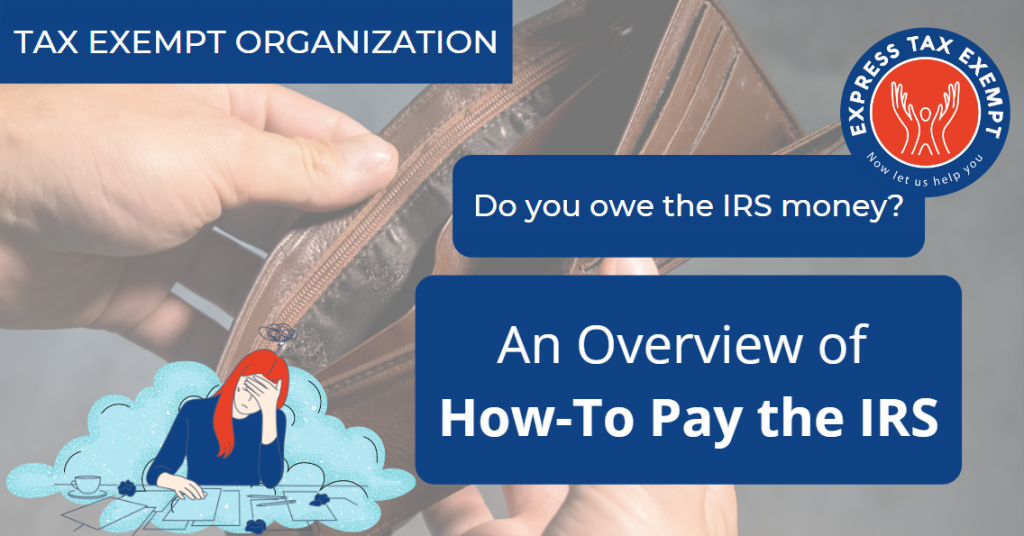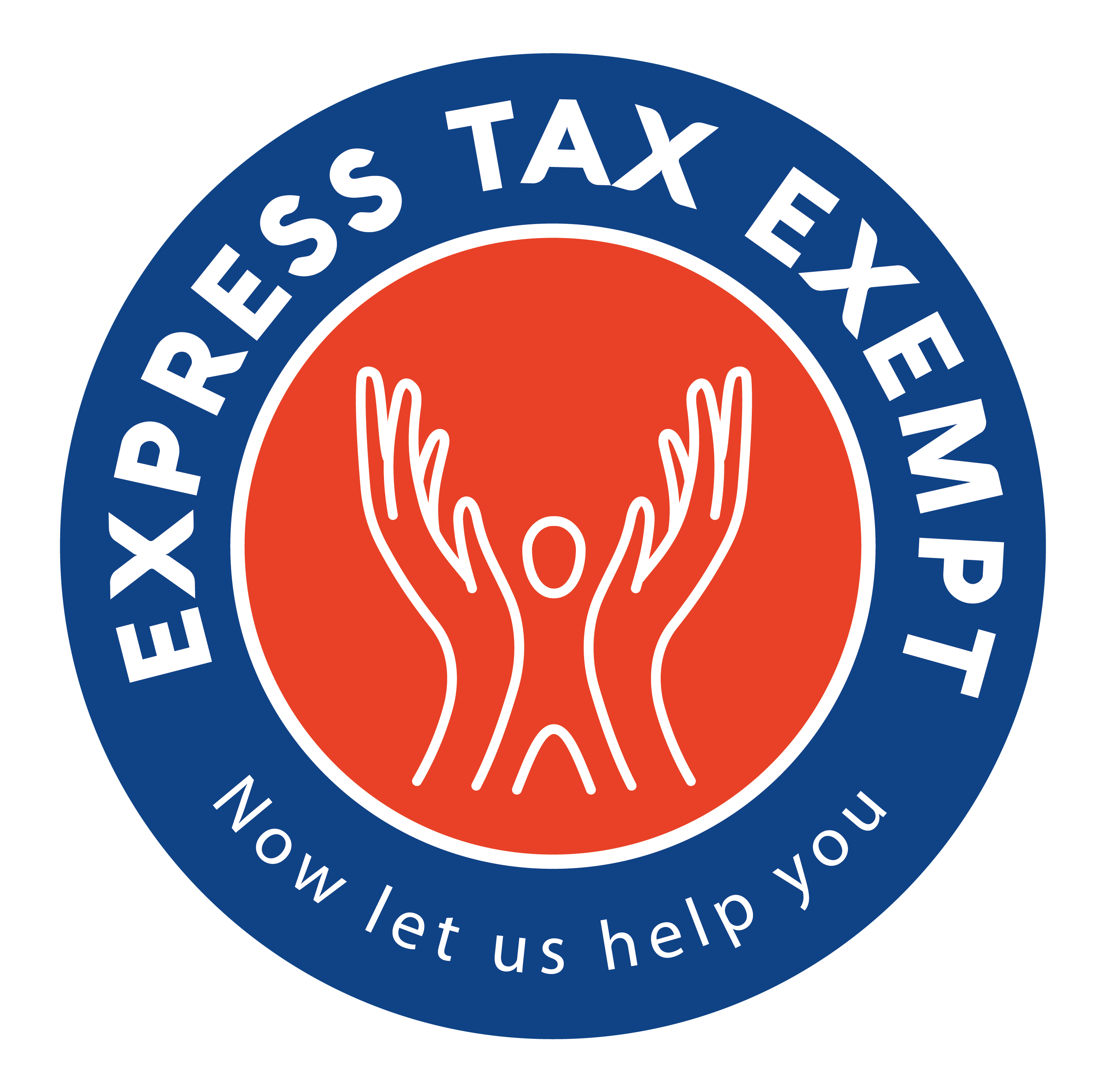Do you owe the IRS Money? An Overview on How-to Pay the IRS

No one enjoys receiving bills in the mail, especially bills from the IRS. If you do receive a bill from the IRS, it is best to take care of it as soon as possible! The longer you wait to pay, the more interest and penalties you can accrue.
Luckily, the IRS offers taxpayers multiple ways to pay. ExpressTaxExempt is going to help take you through a few common reasons why you may owe the IRS money and how to pay your balance.
How do I Pay the IRS?
The IRS offers multiple payment options. When filing your 990 series return with ExpressTaxExempt, you can choose to pay either using the Electronic Federal Tax Payment System (EFTPS) or Electronic Funds Withdrawal (EFW).
When filing a 990 return with ExpressTaxExempt, your organization will need to select a payment method. By selecting a payment option within ExpressTaxExempt, you are confirming that you are aware that you owe the IRS money and have a plan by which you intend to pay. Though ExpressTaxExempt provides payment options, it does not process any IRS payments.
Electronic Federal Tax Payment System
EFTPS is a free tax payment service provided by the U.S. Department of Treasury. Note that it takes about 15 business days to set up an account with EFTPS. Once enrolled, you have the ability to pay any tax due to the IRS. This method of payment allows you to schedule payments 24/7, up to 365 days in advance. Enroll for ETFPS at: https://www.eftps.gov/eftps/.
If you already have an EFTPS account, it only takes minutes to pay your organization’s taxes. Payments must be scheduled by 8 p.m. EST the day before the deadline to be considered received on time by the IRS. Funds will transfer from your bank account on the date you select for your payment.
If you choose EFTPS as your payment option, you are accepting the responsibility to send the tax due payment to the IRS using the EFTPS.gov website or by other means.
Electronic Funds Withdrawal
EFW is an e-pay option that is only offered to individuals who file using a tax preparation software, such as ExpressTaxExempt, or through a tax professional.
If you select EFW as your payment option, you can pay tax return balances when you e-file, make a stand-alone payment after you e-file, or pay estimated and extension tax. Here, you will need to provide bank account information, including a routing and account number, your payment or withdrawal amount, and the date you want the funds to be automatically withdrawn. This will grant the IRS access to withdraw funds directly from the bank account provided.
Create an IRS Account
Taxpayers have the option to create an IRS account by visiting: https://www.irs.gov/payments. With an IRS account, organizations can access tax records, make payments, and view recent payments made. When paying through your IRS account you can pay by bank account, credit card, debit card, or with your IRS digital wallet.
You can keep track of these payments by signing up for email notifications each time you use IRS Direct Pay. These notifications will contain the confirmation number you receive at the end of each payment transaction.
If you choose to pay the IRS directly, you are accepting responsibility to send the tax due payment to the IRS using a credit or debit card. If you need assistance or have questions about paying an IRS balance, you will need to contact the IRS directly. The IRS offers several options where you can pay immediately or arrange to pay in installments.
Visit the IRS “Payments” page to learn more about paying the IRS, to pay a balance, or to set up an IRS Payment Plan.
Why would my organization owe the IRS Money?
There are multiple reasons an organization may owe the IRS money:
- Failure to File:
Failing to file a return or not filing on time is one of the main reasons organizations owe the IRS money. If an organization does not file its annual return on time or fails to pay the taxes due, it may be subject to penalties from the IRS. Failing to file a 990 return for three years can cause an organization to lose its tax-exempt status.
ExpressTaxExempt can help you file an 8868 Extension Form if you’re worried about missing your 990 return deadline. To learn more about late filing penalties the IRS may impose, visit IRS.com.
- Private Benefit:
Unless you are filing a 990-N return you will be asked to provide the salaries of board members, officers, directors, and other key employees in your organization. This is to ensure that no income or assets are used to benefit insiders.
If your organization is found guilty of private benefit, you could be subject to penalties and lose your tax-exempt status.
- Lobbying and Political Activity:
Although tax-exempt organizations are allowed a little room for lobbying, it cannot be a substantial part of your organization’s operations. Contacting, or encouraging the public to contact, entities of a legislative body can hurt an organization’s tax-exempt status.
An important aspect of maintaining your tax-exempt status is to stay neutral with political campaigns. This can be a gray area for certain organizations, such as churches and educational organizations. It’s best to turn to the IRS for more information on these guidelines.
- Unrelated Business Income:
Even though an organization is recognized as tax-exempt, it may still be liable for tax on its unrelated business income. There are certain restrictions on how much income an organization can bring in from unrelated business activities. For example, selling food and beverages and accepting advertising in newsletters and publications are examples of unrelated business activities because they are not substantially related to the organization’s tax-exempt status.
For more information about Unrelated Business Income, visit ExpressTaxExempt’s blog here.
- Changing Purpose:
An organization is expected to uphold its proposed operations, purpose, and activities as outlined in its determination letter. Changes to an organization’s purpose may affect its tax-exempt status.
If an organization is unsure about whether a proposed change in its purposes or activities is consistent with its status as an exempt organization, it should notify the IRS.
ExpressTaxExempt
The best way to avoid owing the IRS money is to stay up-to-date on your tax-exempt filing requirements. Check out ExpressTaxExempt’s blog and Youtube to stay updated on the latest IRS and Form 990 Series information.
If you do owe the IRS money, pay as soon as possible. Not paying may result in additional penalties and the potential of losing your organization’s tax-exempt status.
Realizing you owe the IRS money is stressful. Avoid the stress by filing your Form 990 return early or filing an 8868 Extension Form before your deadline. ExpressTaxExempt is here to help you do so! With ExpressTaxExempt, your organization can file your 990 series return seamlessly and remain tax-compliant!
File your Form 990 or 8868 Extension Form today at ExpressTaxExempt!

